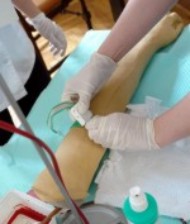Which Phlebotomy Training Program Is Right For You
In most cases, before an individual is allowed to sit for a phlebotomy certification exam, some sort of formalized phlebotomy training is necessary. There are exceptions where a certifying agency will allow past experience to qualify a candidate for an exam, but it doesn’t happen often and the criteria is very strict.

One of the attractive elements of training to be a phlebotomist is that you can find a phlebotomy class that doesn’t take very long to complete. Once you have successfully completed the phlebotomy class and the requisite hands-on training, you are ready for the next step – your phlebotomy certification exam. For those who are in a hurry, the whole process can be completed in less than a year and, in some cases, as little as 6 months.
Types of Schools For Phlebotomy Classes
There are various types of learning institutions available that offer phlebotomy classes. Technical and vocational schools are among the leaders in providing phlebotomy training. Community colleges and medical colleges are other prime options to consider, as well. In recent years online phlebotomy classes have begun to emerge.
Should you decide to look into online phlebotomy classes be sure to inquire about hands-on training. Usually referred to as clinicals, this is where you get the practical, real-world experience and begin to master venipuncture technique, as well as building a resume of successful venipunctures. As noted earlier, most phlebotomy certification agencies require you to have completed a certain number of venipunctures in order to sit for an exam.
Get some great tips on taking your phlebotomy certification exam!
Short-Term vs Long-Term Phlebotomy Training
The choice of a short-term versus long-term training program is, of course, a matter of individual circumstances and objectives. For those who want or, more importantly, need to move into the job market as quickly as possible, a short-term phlebotomy class is ideal. However, if you can afford the luxury of waiting longer to seek employment, longer-term phlebotomy training offers some distinct advantages.
One of the primary plusses of a long-term program is the added skills that are taught. Short-term phlebotomy classes generally teach phlebotomy techniques and procedures. The training includes the types of venipunctures, the types of needles, order of tube usage, and a bit more. But, it is all geared around the technical aspects of phlebotomy.
Long-term phlebotomy training will often incorporate additional skill development into the program. This may include such things as anatomy and physiology, composition and properties of blood, and medical terminology. Intangible skills may also be included in the training in such areas as work ethics and professionalism.
Be Sure It Leads To Phlebotomy Certification
Whichever type of class you opt for, be sure that it properly positions you to take a phlebotomy certification exam with one of the national certifying bodies. With your phlebotomy training and certification in hand, you are then ready for a great new career.




